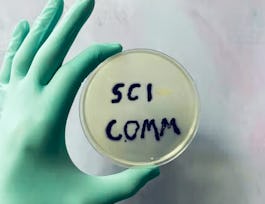In this course, you will explore how to develop and implement evidence-based methods for science communication. We’ll discuss major theories of human learning, cognitive phenomena like bias and motivated reasoning that can undermine even the best activities, and the science behind why mis/disinformation spreads so quickly. We’ll end with motivational interviewing and a discussion of how to use learning engineering to design educational activities.



The Harder Side of Science Communication
This course is part of Designing Effective Science Communication Specialization

Instructor: Melanie Peffer
Sponsored by Pontificia Universidad Católica del Perú
Recommended experience
What you'll learn
Describe the field of the learning sciences.
Describe and compare different theoretical frameworks for explaining human learning.
Explain the relationship between cognitive biases and why people fall for mis/disinformation.
Describe the process of motivational interviewing and its utility in science communication.
Details to know

Add to your LinkedIn profile
3 assignments
See how employees at top companies are mastering in-demand skills

Build your subject-matter expertise
- Learn new concepts from industry experts
- Gain a foundational understanding of a subject or tool
- Develop job-relevant skills with hands-on projects
- Earn a shareable career certificate


Earn a career certificate
Add this credential to your LinkedIn profile, resume, or CV
Share it on social media and in your performance review

There are 4 modules in this course
In this module, you will learn about the learning sciences. You will also discuss the methods used by learning scientists to generate evidence on how people learn.
What's included
3 videos1 reading1 assignment1 plugin
In this module, you will learn about four major theoretical frames for describing human learning. This includes cognitive theories of learning, contextual theories of learning, social cognitive theories and behaviorism.
What's included
4 videos4 readings1 assignment
In this module you will explore cognitive phenomena such as epistemic cognition, cognitive biases, and motivated reasoning. You will also discuss strategies for designing science communication activities that will help mitigate the influence of bias.
What's included
4 videos6 readings1 assignment1 discussion prompt
In this module, you will learn about learning engineering. You will also have a chance to try learning engineering for yourself and either design or re-design a science communication activity using the principles from this course.
What's included
2 videos4 readings1 peer review
Instructor

Offered by
Why people choose Coursera for their career




Recommended if you're interested in Social Sciences

University of Colorado Boulder

University of Colorado Boulder

University of Colorado Boulder

University of Colorado Boulder

Open new doors with Coursera Plus
Unlimited access to 10,000+ world-class courses, hands-on projects, and job-ready certificate programs - all included in your subscription
Advance your career with an online degree
Earn a degree from world-class universities - 100% online
Join over 3,400 global companies that choose Coursera for Business
Upskill your employees to excel in the digital economy


